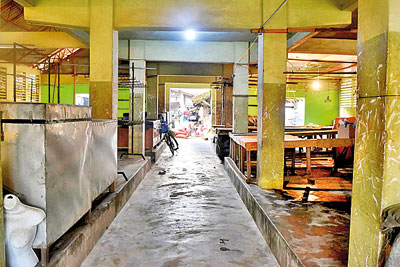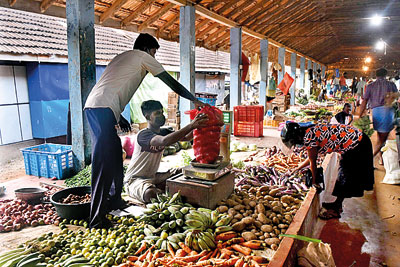News
Northern farmers unable to shed ‘tax’ imposed by separatists
View(s):
Tax levying officials at the market monitor market activities
Francis Anthony Joseph of Pedro Estate, Nuwara Eliya once grew Chinese vegetables in a plot near his house to support the family. But, during the pandemic, he chose to grow leeks and potatoes last year.
He could not get a fair price for his crop.
Joseph cultivated broccoli, iceberg lettuce, rocket lettuce, and bok choy targetting Chinese restaurants in Nuwara Eliya but that was before the pandemic.
Brokers who supply vegetables to supermarkets and retailers in Colombo purchased leeks from farmers at between Rs 20 and Rs 25. It was sold in a metropolitan supermarket chain in Colombo at between Rs 100 and Rs 120.
Farmers claim, that, after deducting transport costs, they would earn Rs 12.
“We cannot go to the wholesalers directly, so we depend on brokers. Usually, they don’t give a good price saying the quality of the vegetables is not good enough,” Mr Joseph told the Sunday Times.
Vegetable prices in Sri Lanka continue to fluctuate as does inflation.
For farmers in the north, the virus pandemic made it worse in addition to a decades-long practice introduced by the LTTE during wartime in markets where a portion of their produce had to be discounted mandatorily, as a tax.
A northern farmer who wants to sell 100 kilos of cabbage, would be paid for only 90 kilos by either a retailer, or broker. The rest — 10 kilos — is considered as a mandatory discount.
Velayutham Kathirkamanathan, a farmer from Atchuvely would go from Jaffna to the Kodikamam public market to sell bananas.
The banana bunch weighs over 60 kilos, but he would be paid only for 50 kilos by the buyer, who he says, had been buying the produce for a longtime and expects a discount.

Uzavar Market or Farmers market complex that was built to enable farmers to sell their products without brokers but currently given to pavement vendors at Kodikamam market
“We cannot demand, or fix a good price, without agreeing to the mandatory discount. If we raise the issue, there would be no one left to buy,” Mr Kathirkamanathan said, noting this is the norm.
With the recent closure of public markets for weeks following coronavirus infections, farmers could not get a fair price, he added.
This mandatory 10 percent ‘discount’ began during wartime when the then Liberation Tigers of Tamil Eelam declared it as a ‘tax’ from trading at public markets. Today, nearly a decade after the defeat of the separatist movement, the practice continues.
Over the years, northern farmer federations took up the issue at every district coordinating committee meeting, but it remains.
“We are tired of taking up this issue. When farmers tried to oppose this at markets, we had to face several difficulties in selling our products. So we are forced to agree to this,” Kandaih Thiyagalingam, president of Federations Farmers Union in Jaffna told the Sunday Times.
Most farmers started to sell their produce directly to dealers who transport vegetables to wholesale markets such as Dambulla, and Narahenpita to get a good price, Mr Thiyagalingam said.
Selvaratnam Mayooran, deputy chair of Chavakachcheri Pradeshiya Sabha under which the Kodikamam public market comes under, said even though the local body passed a resolution against the practice, they could not implement it as the coronavirus pandemic spread.

A vegetable retail seller at Kodikamam public market
“We agree this is not acceptable and very detrimental to farmers, but we simply could not rectify it since many actors are involved,” Mr Mayooran said while stressing that local bodies called for tenders annually to run markets and they are held responsible for levying taxes but not this kind of ‘discount’.
Earlier, the Northern Provincial Council, also tried to amend this practice by introducing Uzavar Santhai, or farmer’s market, where middlemen or brokers are not involved.
But it failed miserably as many farmers were not interested in spending hours in the market. Local government bodies refused to run the markets on their own saying they did not have staff.
Former Northern Provincial minister of agriculture, P. Ayngaranesan, said even though his office tried to end the practice, enforcing a strict procedure at public markets was challenging.
“It seems there has been an understanding between the farmers and the buyers when the quality of the produce is disputed. Even though we asked farmers to make complaints if it continued, there were no complaints,” Mr Iynkaranesan said, while pointing out that it is understandable why they did so considering the future consequences.
The Commissioner of Local Government in the North, M.Patrick Diranjan told the Sunday Times, that legal action can be taken against those who demand a ‘discount’ from farmers as per the permit issued to them, but no such complaints had been made.
“It is mentioned in the legal permit issued to them not to engage in this kind of activity in the market. As state officials, we cannot take action against them on our own without any complaints being lodged,” he said.
Kumar Senanayake representing the Farmers Foundation and Agriculture Livelihood Co-operative society in Nuwara Eliya said vegetable buyers are paying high prices in the provinces.
“The middlemen in the supply chain keep the bulk of the profit and this needs to be stopped, the vegetable farmers say,’’ he said.

Nuwara Eliya: Vegetable buyers are paying high prices in the provinces
Vegetables pass through several parties before they reach consumers.
“One is the supply chain to supermarkets. There is waste in transport in the wholesale business. These make it necessary to price vegetables higher to make up for losses,’’ he said.
The Director Agriculture, T.M.A.K.B. Tennakoon, said farmers should get an additional 40% to cover the costs.
“Nearly five people are involved in the supply chain of vegetables starting from production. Then, in transport, the stuff gets changed at about five points. Here alone some 30% produce goes to waste. We have to improve our packaging, washing practices, and transport to distant centres like Dambulla,’’ he said. From these centres vegetables are distributed elsewhere and this causes more damage. “We can use rail transport.’’
(Additional reporting By Shelton Hettiaarachchi in Nuwara Eliya)


